Movie Easter Eggs: Where Did the Term Come From?
We examine the origins of the term “easter eggs” in regards to movies, video games, and television shows.

“Did you catch that easter egg?” “No, but I read about all these in an easter egg guide.” “Have you heard? Morbius has the greatest easter egg of all-time!” These are (mostly) things you’ll hear in everyday life when folks discuss their favorite movies, TV shows, or video games. Once a jargon-y phrase used almost exclusively in online circles and by the nerdier writers within the greater media industry, the term “easter egg” has become ubiquitous when talking about modern pop culture.
Heck, Marvel Studios has based a sizable portion of its winning formula on the prospect of teasing their next 15 projects through a sprinkling of “easter eggs” in each new movie. This is done, in part, on the assumption that media outlets will write ad nauseam about them. And you know what? Guilty as charged.
Yet with the term’s emerging popularity, it becomes a curiosity, then, where the turn of phrase came from. When did Easter Eggs stop being colorful decorations to put out for a pagan bunny during a Christian holiday, and instead become a daily descriptor for fan service? Well…
The Origins of Pop Culture Easter Eggs
While most folks tend to associate “easter eggs” nowadays with superhero movies, Star Wars in-jokes, and the like, the phrase actually originates from video game history. The first time “easter egg” was used in reference to something other than actual holiday-themed scavenger hunts occurred in 1980 when Steve Wright, the director of software development at Atari Consumer Division, came up with the succinct phrase to describe the little wink to game fans that had been hidden in the company’s video game Adventure.
Developed by programmer Warren Robinett, Adventure was an Atari 2600 game released in 1980 in which gamers played as a high-fantasy hero (but really a pixelated square) who wandered through an open world of dungeons and dragons, all in order to retrieve a magical chalice that needed to be returned to the Golden Castle. However, hidden within the bowels of one of the game’s caverns, and completely divorced from the more linear path that the aforementioned avatar must trod to pick up a key and wander through a wall off-screen, is the first easter egg. And in truth it’s really a credit Robinett wrote for himself.
It reads: “Created by Warren Robinett.” The easter egg was inserted by the game’s designer because he had spent over a year programming the game and was frustrated (among other things) by the Atari policy of not crediting their programmers in the game. So he sneaked this “egg” into the experience, which Atari only found out about after Robinett had left the company, and units of the game had already shipped. Hence the coined phrase of “easter egg.” Because like the prizes of an Easter scavenger hunt, it’s a nice little surprise for gamers to discover.
Technically, this is not the first video game easter egg. That honor might belong to a video game called Moonlander (1973) where players who are attempting to pull a Neil Armstrong can find a hidden McDonald’s on the moon and go and get a hamburger and fries instead of finishing the game’s mission. Nonetheless, Adventure was the first time an easter egg was developed in secret and called, well, an easter egg.
The legacy of this event was greatly enhanced in the 21st century by Ernest Cline’s Ready Player One novel, which was published in 2011. While the book only mentions the Adventure incident in passing, the whole book helped further popularize the term “easter egg” in geek culture and beyond by framing its whole story around a hunt for an all-powerful egg, whose location can be discovered by finding keys and gates hidden throughout a vast virtual universe called the OASIS. And Cline’s own scripted adaptation of that book in the Steven Spielberg movie version of Ready Player One (released in 2018) raised awareness for the original Adventure easter egg to even greater heights by building the entire climax pivot around the movie’s protagonist playing the Adventure Atari game in order to find the final key that will give him access to the OASIS’ ultimate easter egg.
So there you have it, the root etymology for the concept of modern media easter eggs!
